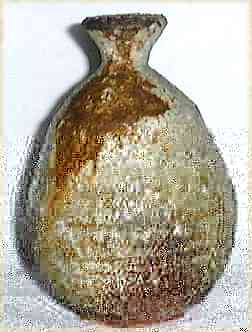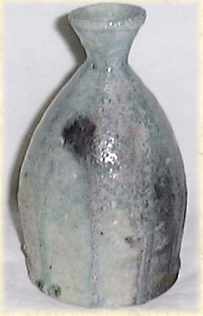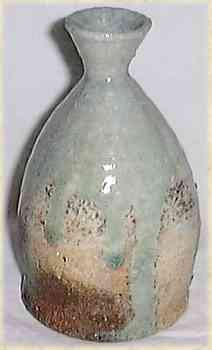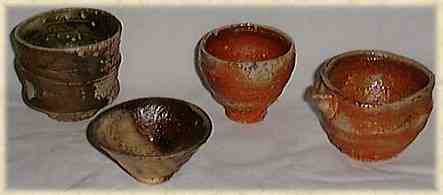|
Keeper of the Flame
 It seems that the ancient anagama, introduced to Japan from Korea in the fifth century, is causing quite a stir in the United States. A recent issue of the American literary magazine Harpers had a 16-page article entitled Before The Temple Of Fire about anagama in Oregon. It seems that the ancient anagama, introduced to Japan from Korea in the fifth century, is causing quite a stir in the United States. A recent issue of the American literary magazine Harpers had a 16-page article entitled Before The Temple Of Fire about anagama in Oregon.
Most of the techniques used by American potters for building and firing an anagama were learned by studying with Japanese masters. In Japan there are hundreds, possibly thousands of potters using an anagama and many can claim expertise in taming and controlling the entity that Harpers calls the "dragon kiln."
Still, the title King of the Anagama would have to go to Japanese artist Furutani Michio (1946 to 2000). His phenomenal Iga and Shigaraki wares are required viewing for any ceramic admirer. Furutani has built more anagama than any other potter I know of (at latest count 30, the first in 1970 and the only one in Shigaraki at the time since the medieval period). He is also the author of the book Anagama - How to Build and Fire that has become required reading for any Japanese anagama ceramist. Before his untimely death in 2000, Furutani was firing his pots from one anagama in Shigaraki (Shiga prefecture) and one in Iga (Mie prefecture).
 His typical anagama is five meters in length with the interior space for pieces about three meters. The shape of the kiln resembles a candle flame, narrow at the front, slightly flaring at the center and tapering off towards the rear. In order to achieve the dazzling range of effects (henka) that he wants he has made the kiln roof quite low, only 1.2 meters in height; this allows for a more hard intense fire and thus more dramatic yohen (kiln changes). Hence the kiln entrance is less than a meter high and to load his kiln (kamazume) Furutani must crawl in and out of it countless times on all fours -- it is a sweat-drenching process. His typical anagama is five meters in length with the interior space for pieces about three meters. The shape of the kiln resembles a candle flame, narrow at the front, slightly flaring at the center and tapering off towards the rear. In order to achieve the dazzling range of effects (henka) that he wants he has made the kiln roof quite low, only 1.2 meters in height; this allows for a more hard intense fire and thus more dramatic yohen (kiln changes). Hence the kiln entrance is less than a meter high and to load his kiln (kamazume) Furutani must crawl in and out of it countless times on all fours -- it is a sweat-drenching process.
Kaneshige Toyo (1896-1967), the first Bizen Living National Treasure in Japan, said that kamazume is THE most important procedure in a firing. Furutani is a staunch believer in these words, and he has followed the advice of Kaneshige with meticulous care. The firing takes a little over four days and nights with kiln temperatures reaching around 1300C. Furutani says that he is not sure of the exact temperature because he does not use a kiln pyrometer but relies on watching the color of the flames and the sound of the kiln; experience and intuition are more important than precise measurements.
 Furutani fires traditionally shaped pieces: large storage jars (tsubo), flower vases (hana-ire), tea bowls (chawan), tea caddies (cha-ire), and wares for the table (shokki). He has also created his own flat sided jar (henko) and an original style in which he uses Shigaraki clay and coats it with a white slip (kohiki) called Shigaraki-Kohiki. The clay is mostly Shigaraki kinose clay which was dug up almost 20 years ago during a construction boom. Furutani has almost 100 tons of it (the most of any Shigaraki potter) and gives this now unavailable treasure most of the credit for the celebrated fire color (hi-iro) that he is so famous for. It is a coarse clay filled with feldspar granules that sometimes burst out on the surface (ishihaze) during a firing or is covered by natural ash-glaze (shizen-yu) rivulets which run from light olive greens to mustard yellows and browns. Characteristics of Iga are scorch markings (koge) and a natural flowing vitrified glaze (biidoro, stemming from the Portuguese word for glass-vidoro) which sometimes stops to form a globule called a dragonfly eye. Furutani fires traditionally shaped pieces: large storage jars (tsubo), flower vases (hana-ire), tea bowls (chawan), tea caddies (cha-ire), and wares for the table (shokki). He has also created his own flat sided jar (henko) and an original style in which he uses Shigaraki clay and coats it with a white slip (kohiki) called Shigaraki-Kohiki. The clay is mostly Shigaraki kinose clay which was dug up almost 20 years ago during a construction boom. Furutani has almost 100 tons of it (the most of any Shigaraki potter) and gives this now unavailable treasure most of the credit for the celebrated fire color (hi-iro) that he is so famous for. It is a coarse clay filled with feldspar granules that sometimes burst out on the surface (ishihaze) during a firing or is covered by natural ash-glaze (shizen-yu) rivulets which run from light olive greens to mustard yellows and browns. Characteristics of Iga are scorch markings (koge) and a natural flowing vitrified glaze (biidoro, stemming from the Portuguese word for glass-vidoro) which sometimes stops to form a globule called a dragonfly eye.
Furutani will be 52 this year and is at the height of his artistic skills. As a young man he bicycled around Japan for 21 months visiting pottery sites. The journey still continues for this humble and dedicated potter, only now within the mysterious universe of the world-renowned anagama.
NOTE: This story was written before the untimely death of Furutani in 2000.
 |
LEARN MORE
|